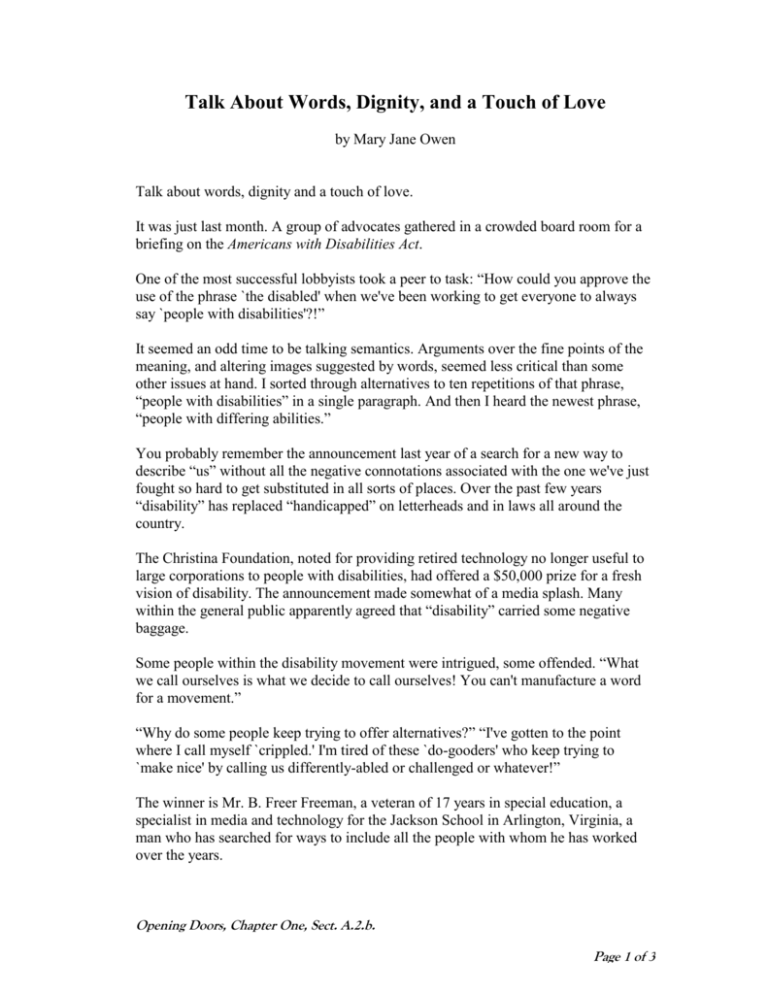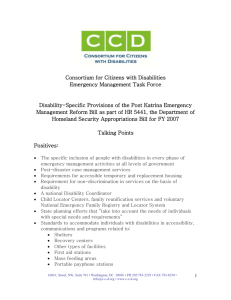Word
advertisement

Talk About Words, Dignity, and a Touch of Love by Mary Jane Owen Talk about words, dignity and a touch of love. It was just last month. A group of advocates gathered in a crowded board room for a briefing on the Americans with Disabilities Act. One of the most successful lobbyists took a peer to task: “How could you approve the use of the phrase `the disabled' when we've been working to get everyone to always say `people with disabilities'?!” It seemed an odd time to be talking semantics. Arguments over the fine points of the meaning, and altering images suggested by words, seemed less critical than some other issues at hand. I sorted through alternatives to ten repetitions of that phrase, “people with disabilities” in a single paragraph. And then I heard the newest phrase, “people with differing abilities.” You probably remember the announcement last year of a search for a new way to describe “us” without all the negative connotations associated with the one we've just fought so hard to get substituted in all sorts of places. Over the past few years “disability” has replaced “handicapped” on letterheads and in laws all around the country. The Christina Foundation, noted for providing retired technology no longer useful to large corporations to people with disabilities, had offered a $50,000 prize for a fresh vision of disability. The announcement made somewhat of a media splash. Many within the general public apparently agreed that “disability” carried some negative baggage. Some people within the disability movement were intrigued, some offended. “What we call ourselves is what we decide to call ourselves! You can't manufacture a word for a movement.” “Why do some people keep trying to offer alternatives?” “I've gotten to the point where I call myself `crippled.' I'm tired of these `do-gooders' who keep trying to `make nice' by calling us differently-abled or challenged or whatever!” The winner is Mr. B. Freer Freeman, a veteran of 17 years in special education, a specialist in media and technology for the Jackson School in Arlington, Virginia, a man who has searched for ways to include all the people with whom he has worked over the years. Opening Doors, Chapter One, Sect. A.2.b. Page 1 of 3 He seems just a trifle perplexed by how upset some people got about semantics. The phrase he developed is about as inclusive as any phrase could be. “People with differing abilities” pretty much covers any crowd. And that's just what Mr. Freeman wanted: a way to make the point that everyone is somewhere on the abilities continuum. But, of course, the problem doesn't get solved that easily. No matter what words are selected, if attitudes don't change, eventually that new phrase will take on the negative connotations of the past. Within another civil rights movement we've seen an evolution from “colored” to “Negro” to “black” to “African American” as proud people moved away from the negative stereotypes which invaded each attempt to move beyond them. Hasn't the same thing happened in the transition from “incurable” and “invalid” to “crippled,” “handicapped” and “impaired”— and finally on to “disabled?” The difference between these two paths away from past stigmas is significant. There wasn't an insistence on a phrase like “people who are black” or “people who are of African descent.” The group's identify was stressed as if acknowledgement that the discrimination experienced by one was an attack on the dignity of all. Can our collective political power develop fully until the “person” takes on lesser importance in our rhetoric? Could it be that all these years of insisting we are people first has interfered with our ascendancy into full status as a minority? Is it better to organize around those shared characteristics which make us different from those who would discriminate against us? There once was a bitter disabled man. He couldn't believe he might be lovable. He was a puzzle until an old joke came to mind which goes something like this: “I wouldn't want to join any club which let people like me become a member!” His actions said, “I really couldn't respect anyone who had such poor judgment as to think I'm great!” During the 1977 sit-in, assorted people were making tremendous personal sacrifices for disability civil rights, and a game of “make a wish” relieved the tension. Many wanted things which such prizes as that $50,000 might have purchased. But one of the youngest and most naive among us better understood our common need. “Not long ago, if I'd been asked that question, I'd have wished to be beautiful, not crippled with these braces and crutches. But today I know these things don't make me ugly. And I'm truly beautiful just as I am!” This young woman had learned about her loveliness during the 28 days when all of us lived together in great intimacy, sleeping on the floor, doing without any Opening Doors, Chapter One, Sect. A.2.b. Page 2 of 3 conveniences and caring for each other's needs. Whether blind or deaf, mentally retarded or mentally brilliant, wheelchair or cane or crutch users, or people whose disabilities didn't show, we learned of our value by loving and being loved by our peers in our common search for mutual dignity. Whatever we call ourselves or what “they” call us will hardly matter at all—once we understand the lesson that young woman discovered while involved in a campaign for equity, not just for herself alone, but for the group. Turf battles and disputes which divide us, self disgust, and a failure to see the merit in each of our colleagues in disability are more dangerous to our campaign for dignity than any enemy could be. A touch of love can go a long way in countering the stereotypes which separate us from our power. This article may be reprinted provided you credit the source: The National Focus, March-April 1991 Opening Doors, Chapter One, Sect. A.2.b. Page 3 of 3






